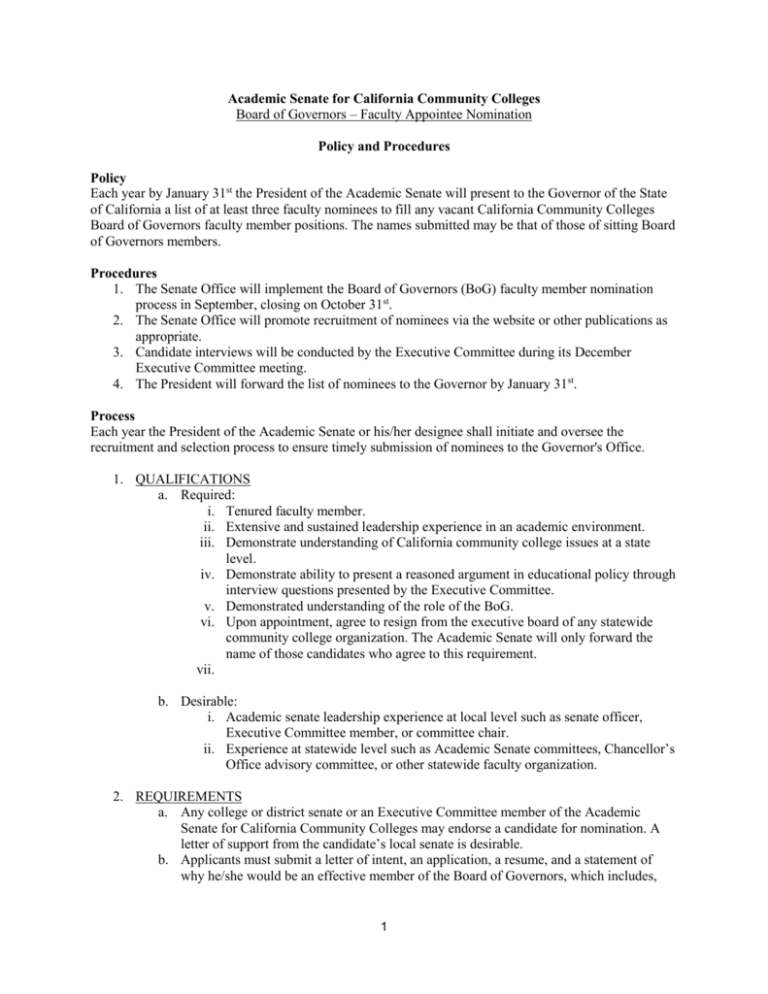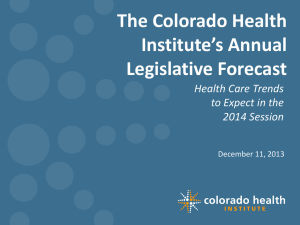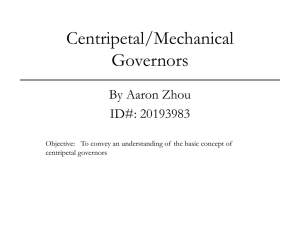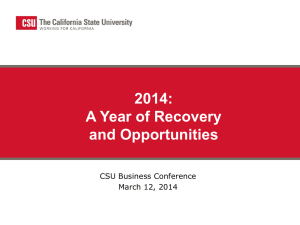Academic Senate for California Community Colleges
advertisement

Academic Senate for California Community Colleges Board of Governors – Faculty Appointee Nomination Policy and Procedures Policy Each year by January 31st the President of the Academic Senate will present to the Governor of the State of California a list of at least three faculty nominees to fill any vacant California Community Colleges Board of Governors faculty member positions. The names submitted may be that of those of sitting Board of Governors members. Procedures 1. The Senate Office will implement the Board of Governors (BoG) faculty member nomination process in September, closing on October 31st. 2. The Senate Office will promote recruitment of nominees via the website or other publications as appropriate. 3. Candidate interviews will be conducted by the Executive Committee during its December Executive Committee meeting. 4. The President will forward the list of nominees to the Governor by January 31st. Process Each year the President of the Academic Senate or his/her designee shall initiate and oversee the recruitment and selection process to ensure timely submission of nominees to the Governor's Office. 1. QUALIFICATIONS a. Required: i. Tenured faculty member. ii. Extensive and sustained leadership experience in an academic environment. iii. Demonstrate understanding of California community college issues at a state level. iv. Demonstrate ability to present a reasoned argument in educational policy through interview questions presented by the Executive Committee. v. Demonstrated understanding of the role of the BoG. vi. Upon appointment, agree to resign from the executive board of any statewide community college organization. The Academic Senate will only forward the name of those candidates who agree to this requirement. vii. b. Desirable: i. Academic senate leadership experience at local level such as senate officer, Executive Committee member, or committee chair. ii. Experience at statewide level such as Academic Senate committees, Chancellor’s Office advisory committee, or other statewide faculty organization. 2. REQUIREMENTS a. Any college or district senate or an Executive Committee member of the Academic Senate for California Community Colleges may endorse a candidate for nomination. A letter of support from the candidate’s local senate is desirable. b. Applicants must submit a letter of intent, an application, a resume, and a statement of why he/she would be an effective member of the Board of Governors, which includes, 1 but is not limited to a commitment to students and the mission of community colleges, and a reference to qualifications for the position. c. Any faculty member previously considered who wishes to be reconsidered must submit a letter of intent and may update his/her application if necessary. 3. PROCESS AND TIMELINE a. In early September, the Senate Office will send out an announcement letter to each campus through the senate president. At the same time, previous nominees will receive an announcement inviting them to reactivate their file. b. The application process for potential nominees will close by October 31st. 4. RECRUITMENT PROCESS a. The Executive Committee, Outreach and Recruitment, Standards and Practices and Local Senates Committees will recruit candidates for nomination to the Board of Governors. 5. INTERVIEWS a. September: The Executive Committee will determine whether or not to seek nominations for the Board of Governors taking into consideration the Governor’s appointment process and the need to submit names. b. October/November: The Senate Office will initially screen the applications to assess if the candidates meet the nomination requirements and will be responsible for scheduling interviews for qualified candidates. The Officers and Executive Director will paper screen the applications based on criteria listed in the qualifications section of this process and determine who will be interviewed by the Executive Committee. c. November: The President of the Academic Senate shall develop questions that the Executive Committee will use in the interviews of candidates. The President may use questions suggested by Executive Committee members. To preserve the confidentiality of the process and to ensure fairness to nominees, the Executive Committee will review the interview questions in closed session. d. December: Unless otherwise noted, all candidates must be interviewed by the Executive Committee to be considered for nomination to the Governor. i. The President, in consultation with the Executive Committee, may elect to not interview past candidates who were selected to be forwarded to the Governor if there is a 2/3 majority of sitting Executive Committee members who participated in that previous interview session. The Executive Committee would still consider whether or not to send the candidate’s name forward to the Governor for appointment. ii. The Executive Committee may decide to send forward the name of a sitting Board of Governors member without an interview. iii. The Executive Committee will ask each interviewed candidate the same questions; however, follow up questions are allowed. iv. After all interviews are completed the Executive Committee will select at least three candidates, by majority vote, for recommendation to the Governor’s Office as nominees to fill the Board of Governors appointment(s). e. If three candidates are not selected, the Executive Committee will reopen the process and actively recruit new candidates for nominations. Note: nominee selection is not comparative. One, several, or all candidates may be selected to be forwarded for nomination. 2 6. INTERVIEW RECUSAL Any Executive Committee member may elect to recuse him/herself from the process. a. The recused member may sit in as a non-participating observer. If desired, the minutes will note that the member was recused. b. The recused member may elect to recuse him/herself from one or all of the interviews. Note: Recusal shall mean noninvolvement of an Executive Committee member in any discussion of, and decision regarding, the relevant matter to ensure that the member’s independence of judgment is not compromised, that the public's confidence in the integrity of the Executive Committee is preserved, and that the Senate’s mission is protected. 7. NOTIFICATION PROCESS a. The Academic Senate Office will notify candidates whether their names will be forwarded to the Governor's Office the week following the interviews. b. The President will transmit the Executive Committee’s recommendations to the Governor’s Office by January 31st. c. Candidates forwarded to the Governor will be informed about the process for submitting applications to the Governor’s office, including how to submit a Governor’s application and expectations of interviews with the Governor’s staff. 8. REVIEW PROCESS The Standards and Practices Committee will review the process yearly and recommend any changes by May. Approved: August 12, 2011 Revised: December 26, 2011 Approved: February 3, 2012 3








